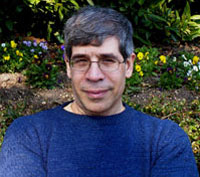MUST WE ALWAYS CATER TO THE FAITHFUL WHEN TEACHING SCIENCE? [JERRY COYNE:] Must we always cater to the faithful when teaching science?
As an example of the "official position" of some groups on compatibility, an alert reader sent me the URL of a site at The University of California at Berkeley, Understanding Science 101, that discusses the nature of science and how it's done. There are a lot of good resources at this site, but perusing it I found, to my dismay, a sub-site that pushes the compatibility between science and faith:
It seems to me that we can defend evolution without having to cater to the faithful at the same time. Why not just show that evolution is TRUE and its alternatives are not? Why kowtow to those whose beliefs many of us find unpalatable, just to sell our discipline? There are, in fact, two disadvantages to the "cater-to-religion" stance. 1. By trotting out those "religious scientists", like Ken Miller, or those "scientific theologians," like John Haught, we are tacitly putting our imprimatur on their beliefs, including beliefs that God acts in the world today (theism), suspending natural laws. For example, I don't subscribe to Miller's belief that God acts immanently in the world, perhaps by influencing events on the quantum level, or that God created the laws of physics so that human-containing planets could evolve. I do not agree with John Haught's theology. I do not consider any faith that touts God's intervention in the world (even in the past) as compatible with science. Do my colleagues at the NAS or the NCSE disagree? 2. The statement that learning evolution does not influence one's religious belief is palpably false. There are plenty of statistics that show otherwise, including the negative correlation of scientific achievement with religious belief and the negative correlation among nations in degree of belief in God with degree of acceptance of evolution. All of us know this, but we pretend otherwise. (In my book I note that "enlightened" religion can be compatible with science, but by "englightened" I meant a complete, hands-off deism.) I think it is hypocrisy to pretend that learning evolution will not affect either the nature or degree of one's faith. It doesn't always, but it does more often than we admit, and there are obvious reasons why (I won't belabor these). I hate to see my colleagues pretending that faith and science live in nonoverlapping magisteria. They know better. Because of this, I think that organizations promoting the teaching of evolution should do that, and do that alone. Leave religion and its compatibility with faith to the theologians. That's not our job. Our job is to show that evolution is true and creationism and ID aren't. End of story. In 25 years of effort, these organizations don't seem to have much effect on influencing public opinion about evolution. I think that this may mean that the USA will have to become a lot less religious before acceptance of evolution increases appreciably. |
While going through the Berkeley website Understanding Science (discussed yesterday), I found something more of interest. It's a page called "Astrology: Is it Scientific?", which sets out a checklist of questions that the student should answer to see if astrology is indeed a science. Here's part of the checklist: Here we'll use the Science Checklist to evaluate one way in which astrology is commonly used. See if you think it qualifies as scientific!
The page concludes by saying:
It seems to me that some of the claims of many faiths are similar to those of astrology–the four ideas given above. Religion focusses on the natural world (at least some of the time), purports to explain it, uses testable ideas (e.g., efficacy of prayer), and relies on evidence (Scripture, archaeological findings, etc.) Like astrology, religion fails all of these tests.
I'm not trying to say anything portentous, except that scientists are really keen to denigrate astrology while at the same time bending over backwards to respect religion, even though there is the same amount of evidence supporting each. This is a point that science writer Natalie Angier makes in her wonderful essay, "My God Problem."
A couple more points of clarification about the last post: 1. I am by no means denigrating the worthwhile achievements of the National Academy of Sciences and the National Center for Science Education in pushing back the tide of creationism. Their effects (especially the NCSE's) in court cases and school-board hearings have had a real and positive effect on keeping evolution in the schools. My beef is that these effects are temporary ones. Creationism is like herpes: it keeps coming back again and again until you extirpate the root cause. The court cases and school board hearings are outbreaks of herpes, which are stanched by our colleagues. But until the underlying virus is extirpated (that is, the kind of faith that is incompatible with evolution), the outbreaks will continue to occur. 2. The NAS and NCSE seem to always trot out the "religious scientists" or "scientific theologians" when they need to sell evolution: John Haught, Ken Miller, Michael Ruse, etc. I would feel better about the whole issue if they'd also trot out Richard Dawkins, Daniel Dennett, and the many other evolutionists who represent a non-accommodationist point of view. 3. By saying that we should leave the reconciliation of faith and science to theologians, I am not endorsing the idea that they can or should be reconciled. Personally, I don't think they can be. I'm saying only that that reconciliation is not the job of scientists or pro-evolution organizations. |
John
Brockman, Editor
and Publisher |
|Top| |


